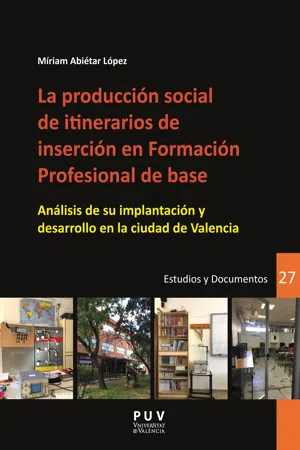
La producción social de itinerarios de inserción en Formación Profesional de base
Análisis de su implantación y desarrollo en la ciudad de Valencia
- 252 pages
- English
- PDF
- Available on iOS & Android
La producción social de itinerarios de inserción en Formación Profesional de base
Análisis de su implantación y desarrollo en la ciudad de Valencia
About this book
El objetivo de esta publicación es describir y analizar el proceso de desarrollo e implementación de la Formación Profesional de base en la ciudad de Valencia. Este nivel educativo se concreta en el marco de la vigente Ley Orgánica de Mejora de la Calidad Educativa (LOMCE) en los programas de Formación Profesional Básica y en los Programas Formativos de Cualificación Básica, siendo estos últimos una concreción específica de la Comunidad Valenciana. Con este fin, dirigimos este estudio a las prácticas educativas en dicho nivel desde una perspectiva dimensional de justicia social que permite relacionar los itinerarios producidos en los programas con las posibilidades de participación social del alumnado que los cursa. Así pues, la manera en que abordamos las desigualdades en el sistema educativo no se centra directamente en el estudio del fracaso escolar y/o del abandono educativo temprano, sino en las prácticas en los contextos educativos dirigidos a este alumnado y en los efectos en sus itinerarios futuros.
Frequently asked questions
- Essential is ideal for learners and professionals who enjoy exploring a wide range of subjects. Access the Essential Library with 800,000+ trusted titles and best-sellers across business, personal growth, and the humanities. Includes unlimited reading time and Standard Read Aloud voice.
- Complete: Perfect for advanced learners and researchers needing full, unrestricted access. Unlock 1.4M+ books across hundreds of subjects, including academic and specialized titles. The Complete Plan also includes advanced features like Premium Read Aloud and Research Assistant.
Please note we cannot support devices running on iOS 13 and Android 7 or earlier. Learn more about using the app.
Information
Table of contents
- Inicio
- Portada
- Créditos
- ÍNDICE
- PRESENTACIÓN
- CAPÍTULO 1. LA SITUACIÓN DE PARTIDA: EL CONTEXTO SOCIAL E INSTITUCIONAL DE LA FORMACIÓN PROFESIONAL DE BASE
- CAPÍTULO 2. LOS FUNDAMENTOS TEÓRICOS Y METODOLÓGICOS
- CAPÍTULO 3. LO EXPLORADO: LA FORMACIÓN PROFESIONAL DE BASE EN LA CIUDAD DE VALENCIA
- CAPÍTULO 4. CONCLUSIONES Y PROPUESTAS
- BIBLIOGRAFÍA